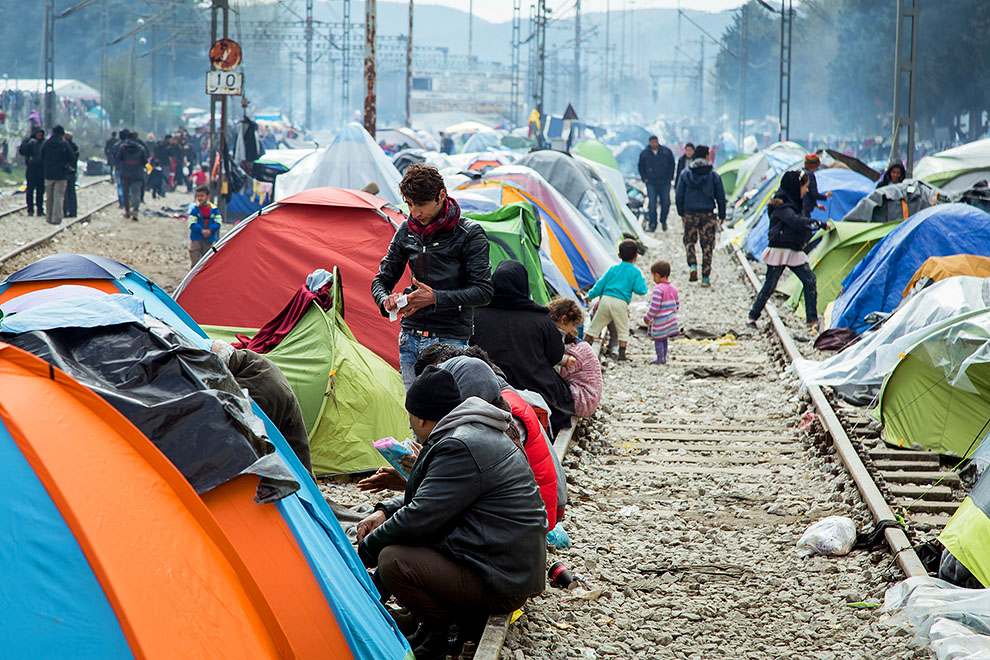Hardly anywhere has the political maxim that one should never waste a good crisis been more applicable than in the European Union. Over the decades, Europe has often needed crises to provide the impetus for further integration. In the current refugee crisis, however, this political truth has been put to a serious test.
With the agreement on the return of refugees from Greece to Turkey now operational, the Union hopes it has found a solution to the flow of migrants trying to enter Europe. The crisis gave Europe one of its greatest challenges by combining two potentially explosive political problems: rising opposition to the idea of European integration among citizens and the slow and cumbersome decision-making processes within European institutions. Combined, they have made it almost impossible to come up with an effective common approach to the challenges of migration.
The citizen revolt against the European Union
The European Union has always been an elite project, driven by politicians, diplomats, civil servants and interest groups that saw the benefits of closer cooperation. The attitude of most citizens reflected what political scientists Liesbet Hooghe and Gary Marks dubbed a “permissive consensus”: the project was supported by most citizens not so much out of warm feelings but out of a sense that European integration was acceptable as long as it delivered results without impinging too much on people’s lives.
This attitude has changed profoundly. To be sure, there has always been opposition to the European Union, both from left-wing parties that saw it as a neoliberal ploy and from right-wing parties that wanted to protect national identities. But these are usually fringe players in European politics. The large, centrist parties supported European integration; even if their voters tended to be more split over the issue, the permissive consensus allowed them to ignore these divisions.
Over the past two decades or so, this has changed, though the exact causes are difficult to pinpoint. One reason may be that the European Union itself has developed spectacularly, from a free-trade zone with some auxiliary policies in the early 1990s to a political union with a common currency and shared policies in sensitive areas such as crime-fighting, immigration and foreign policy. And it has grown from twelve (Western European) member states before 1995 to twenty-eight members in all corners of the continent.
Studies of Euroscepticism also show that opposition to the European Union is closely linked with a range of other identity-related issues, such as opposition to migration, to Islam and to globalisation in general. This package of issues forms the core platform of a range of right-wing “populist” parties that have made spectacular gains across Europe over the past years. Even European countries that for a long time seemed immune to this type of political sentiment, such as Germany and Sweden, have seen these parties win significant results in recent elections.
The rise of these parties and the political sentiment they represent has put considerable pressure on governing centrist parties, which are losing voters to openly Eurosceptical parties. As a result, they are increasingly forced to confront the issues their voters are split over. As Hooghe and Marks put it, popular attitudes towards the European Union have gone from a permissive consensus to a constraining dissensus. With their every step scrutinised by opponents at home, political elites can no longer hammer out compromises at European Union level without giving much thought to their voters.
In this context, the refugee crisis is an issue from hell. Politically speaking, opposition to (Muslim) migrants is closely linked with opposition to the European Union. The influx of refugees from Syria, Afghanistan and countries in Northern Africa has given a tremendous electoral boost to the same right-wing parties that oppose further European integration. This has put the leaders of many EU member states in a catch-22 situation: in order to stem the flow of migrants, EU-level solutions are needed, but every move to strengthen the European Union will run into opposition from Eurosceptics.
A most imperfect Union
On top of this, the European Union is extremely ill-equipped to take (let alone implement) far-reaching decisions at short notice. It is a highly peculiar political experiment that combines two political logics. On the one hand, it is an organisation formed by sovereign states, and without those states no decision can be taken. On the other hand, it shows a number of state-like features itself, such as a quasi-government (the European Commission), a directly elected parliament and an independent (and powerful) Court of Justice, which all play a role alongside member-state governments.
This has led to a complicated institutional entity that looks like a state in many ways but also involves a lot of interstate diplomacy. No wonder, then, that the former president of the European Commission, Jacques Delors, once called the European Union an “unidentified political object.” Neither state nor organisation, it hovers in a postmodern political space.
In many cases, this system works remarkably well. Complex and arcane it may be, but it has come up with shared solutions in a range of areas while carefully balancing the various interests at stake. The end result may not always be pretty or easily understood, but this is the case in many domestic political systems as well.
But there are two caveats to this institutionalised political balancing act: speed is not the forte of the system and enforcement normally takes a back seat to decision-making. These two factors are making themselves felt with particular force in the refugee crisis.
Since the European Union has no clear political centre of gravity, quick and decisive action is rare. During the recent financial crisis, this was demonstrated by the (unintentionally) ironic title of a report on the future of the euro named The Five Presidents’ Report: Completing Europe’s Economic and Monetary Union, written as it was by the presidents of the European Council (which brings together the heads of state and government of the member states), the European Parliament, the European Commission, the European Central Bank and the “Eurogroup” of member states within the eurozone. There’s even a sixth president in the equation: the top position in the Council of Ministers, which rotates among member-state governments every six months. This proliferation of presidents exemplifies the highly dispersed nature of political authority in the European Union, which leaves everyone, and no one, in charge.
Given sufficient time, this apparatus is able to come up with quite impressive advances, especially in comparison with other regimes. During the financial crisis, time was bought with ad hoc financial support measures by national governments that kept (virtually) bankrupt banks and member states afloat while discussions on more permanent solutions continued. Even though these support measures ran into the hundreds of billions of euros and austerity measures wreaked social havoc in debtor countries, popular opposition never reached the point where political leaders were forced to abandon the strategy.
The refugee crisis seems different. Citizens all across Europe have reacted intensely to the prospect (or reality) of (tens, hundreds of) thousands of refugees coming to their countries. Reactions have included local (and sometimes violent) resistance to the location of refugee camps, large-scale demonstrations against migration and the “Islamisation” of Europe, and a dramatic rise in support for right-wing populist parties across the continent. For others, this brings back ghosts of Europe’s dark past, with nationalist and xenophobic sentiments seeming to carry the day and dominating the debate. And for political leaders, the citizens’ response has had the practical implication of limiting the scope to buy time. They need to act now or they may face civil unrest and political defeat at the next elections.
The limits of enforcement and implementation
That’s not to say that action hasn’t been taken at the European Union level. But this is where another of its weaknesses comes to the fore: its limited capacity to implement and enforce decisions.
In the northern autumn of 2015, several decisions were made in an attempt to handle the flow of incoming refugees. Most significantly, a system of relocation was envisaged that would “redistribute” 160,000 refugees from Greece and Italy to other EU member states – with each state being assigned a quota. This was meant to offer some relief to Greece and Italy, where most migrants from the Middle East and North Africa – around 880,000 in 2015 – have entered the European Union. Although these migrants mostly want to move on to countries in northwestern Europe, under EU rules they are obliged to apply for asylum in the country in which they enter the European Union, and this has put huge pressure on the (already non-functioning) asylum systems in the two countries.
The decision to assign quotas to all EU member states met with strong opposition from a number of member-state governments, mainly in Central and Eastern Europe, which openly resisted admitting Muslim migrants. In the end, the plan was pushed through the Council of Ministers, but several governments immediately announced they would not accept any of the relocated migrants.
In order to make this system work, a number of “hotspots” were to be set up in Greece and Italy to receive incoming refugees and process their applications. Moreover, member states were to provide the expert staff needed to make the whole system work.
So far, the results of these decisions have been meagre, to say the least. By mid March 2016, no more than 937 refugees had been relocated from Greece and Italy to other member states – a far cry from the 160,000 originally envisaged, which itself is only a minor portion of the total number of people who have entered Greece and Italy. Although most hotspots envisaged in Greece and Italy are now operational, the Commission reported in early April that the two EU agencies responsible for coordinating the process had received only 1197 pledges of experts from member states, out of the 2380 that had been requested.
Enter Turkey: the deus ex machina?
The inability to come up with effective solutions to the refugee crisis led to a climate of rising tensions among EU member states earlier this year. Several member states unilaterally decided to close the borders with their neighbours, leading to the reintroduction of internal border controls and trapping large groups of refugees in front of the fences that some member states physically erected to keep them out.
It is in this context that political leaders turned to an external solution involving Turkey, with which an agreement on resettlement of refugees was reached in early March. The idea is simple: all refugees entering Greece through Turkey would be sent back to Turkey, thus alleviating pressure on Greece and discouraging refugees from trying to cross the Aegean in the first place. In return, Turkey would receive financial compensation (eventually up to €6 billion). Moreover, for every refugee returned, the European Union would accept one Syrian refugee from a Turkish refugee camp.
If it works out as foreseen, this deal offers a number of benefits to the European Union. To begin with, it will turn the irregular flow of migrants into a regulated flow. Moreover, it will allow the European Union to accept refugees displaced because of the war in Syria while keeping out migrants from other parts of the Middle East and North Africa. Finally, with fewer migrants attempting to go to Greece, it is believed that total numbers will eventually decline.
Creative as the agreement with Turkey may be, it is also an admission of defeat on the part of the European Union. Unable to shore up its own borders and develop a workable approach to dealing with refugees once they are in Europe, it has effectively contracted out the solution to an external party. It is now up to Turkey to control the European Union’s borders.
One crisis too many?
With the agreement with Turkey now operational, new and troubling questions have arisen. Will the European Union be able to organise the return of refugees from Greece to Turkey? Will the regulated entry of Syrian refugees from Turkey work in practice? With the route through Turkey cut off, will migrants return to alternative routes, for instance from Libya to Italy across the Mediterranean? These questions are accompanied by protests from NGOs and the UN refugee agency about human rights violations, both in the process of returning refugees to Turkey and in their treatment in Turkish refugee camps.
For now, though, the agreement has served one important political goal: it has bought the time needed for EU political leaders to come up with more enduring structural solutions. Several proposals are already on the table. In December 2015, the European Commission released a proposal for a European Border and Coast Guard, which would be able to intervene when member states are not able to protect their own (and thereby the European Union’s) borders. This is part of a broader package of proposals to develop a more integrated approach to migrants in the European Union.
As in earlier crises, the refugee crisis may provide the impetus needed to accept these proposals. At the same time, it is not self-evident that member states will go along with them. The breathing space offered by the agreement with Turkey will give political leaders some time to reflect, but they will still feel the pressure from anti-migrant and anti-EU sentiment among their voters. Many of the Commission proposals are highly controversial among the member states, which is likely to lead to protracted decision-making and watered-down compromises.
It is a process that has worked in the past, as the European Union has been built up in bits and pieces, adopting pragmatic solutions for pressing problems. It remains to be seen, however, whether this will be one more crisis too good to waste or whether it will prove one crisis too many. •




